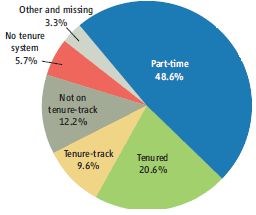Dan Clawson is Professor of Sociology at the University of Massachusetts and he writes in the latest issue of Science [Vol. 324. no. 5931, pp. 1147 - 1148]: "Tenure has been eroded by structural pressures, but remains vital to universities that value creativity."
 Distribution
of US Faculty. Distribution
of US Faculty.
Credit: Science, data from National Center for Education Statistics (NCES), Employees in Postsecondary Institutions (NCES, Washington, DC, Fall 2007) |
Professor Clawson lists what he considers to be the most trenchant arguments mounted against tenured positions at universities by its opponents:
-
"Lifetime job guarantees border on being immoral" according to James Carlin, "a businessman for over 35 years" and the former Chair of the Board of Higher Education of Massachusetts.
-
"Tenure inhibits the strategic reallocation of resources".
-
"The public perception that tenure protects ‘deadwood’ is, alas, correct," wrote Donald Kennedy, former president of Stanford University [and former editor in chief of Science].
-
"From the perspective of many trustees and administrators," Chait notes, tenure "limits management's capacity to replace marginal performers with demonstrably or potentially better performers".
-
"The tenure system is inflexible and limits administrators' ability to improve schools and departments" according to 83% of the business executives surveyed. Trustees believe that tenure creates "an unacceptably potent buffer against centralized initiatives.... Tenure weakens the relative authority of executives."
And he summarises: "The arguments against tenure are compelling to those who support a world where university 'presidents have become CEOs' and 'the administration has become management,' as described by Richard Chait, professor of higher education at Harvard University."
His article also brings to mind an overheard comment made in all seriousness by a group of administrators at one of the United States "Big Ten" universities some year ago: "We would run this place really well if it weren't for the faculty and students."
But just what are the arguments in favour of tenured faculty positions?
Professor Clawson writes:
The shift away from tenure has ramifications for the fundamental social principle on which universities are organized—professionalism... Professionals treat each other as peers and are accorded a considerable degree of self-governance. The idea of professionalism is that professionals cannot be properly evaluated by those from the outside and that professionals can be trusted to evaluate and police themselves, operating not on the basis of self-interest but rather with a vision of some larger good. This is the logic, for example, behind peer review by journals or the practice of faculty making the primary decision of whether or not someone deserves tenure. Professional control, however, gives faculty the leverage to resist efforts to alter the university in response to market logic.
So, for example, in August 2007 Oxford's congregation, voted just over 60% against accepting governance by a majority external to the university, and the vice-chancellor, John Hood, who was strongly in favour came very close having to resign. And more recently Cambridge has resisted governmental pressure to have a majority of external members on its governing council.
The fundamental problem in Professor Clawson's view is that "a university is not supposed to be a business; viewing it as one shows not hard-headed realism but a failure to understand what gives the university its strength and potential. Tenure-system faculty are a problem to administrators and trustees precisely because tenure-system faculty have an alternative vision of the university and the power to act on that vision." In short it is the difference between viewing the role of university faculty as mere deliverers of content as opposed to the providers of learning in the broadest sense.
Which isn't to say that there aren't tenured university staff that aren't decaying wood, but to throw the baby out with the bathwater, as the proponents of the mercantilisation of universities would stipulate, is no solution.
A couple of events may be worthwhile to ponder:
Richard Feynman in one of his reminiscences notes a short exchange he had with his superior in the physics department at Cornell University, Robert Wilson, not long after Feynman, still in his twenties, had been appointed in 1945: "Bob Wilson, who was head of the laboratory there at Cornell, called me in to see him. He said, in a serious tone, "Feynman, you're teaching your classes well; you're doing a good job, and we're very satisfied. Any other expectations we might have [such as research productivity] are a matter of luck. When we hire a professor, we're taking all the risks. If it comes out good, all right. If it doesn't, too bad. But you shouldn't worry about what you're doing or not doing". Feynman received the Nobel Prize in Physics in 1965.
And in July 2001 TFW had this item:
In May of this year we ran a News & Views piece on Paul
Ginsparg who ten years ago founded arXiv which became the avenue of choice
for preprints in the physical sciences. Students and researchers from Nobel
laureates to undergraduates access it on a daily basis to keep up with the
latest research. Among other things it has been invaluable to workers in
countries where resources don't extend to journal subscriptions.
Ginsparg will now be leaving the Los Alamos National Laboratory, under less
than amicable circumstances, for Cornell University which will allow him to
continue and extend arXiv using it as a model for research into digital
libraries. As Ginsparg describes it, the last straw was a recent salary
review which described him as, "a strictly average performer by overall lab
standards; with no particular computer skills contributing to lab programs;
easily replaced, and moreover overpaid, according to an external market
survey".
The Chair of the Department of Physics at Cornell, Peter Lepage's sardonic
comment was, "Evidently their form didn't have a box for: 'completely
transformed the nature and reach of scientific information in physics and
other fields'."